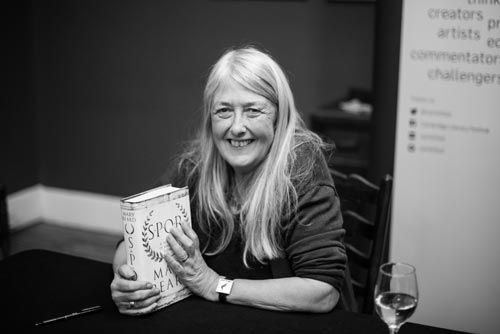History is a conversation; always changing, always ‘modern’
Mary Beard

Mary Beard: A portrait by Chris Boland
Mary Beard, though she shies away from the title of ‘the most famous classicist in the world’, is the doyenne of Roman scholars, role model for young women and widely known as ‘Britain’s most beloved intellectual’ who makes history accessible through her books and TV documentaries.
At the Galle Literary Festival, Mary will talk with Sandra Hill about her book Emperor of Rome, and host a discussion on Televised Retelling with fellow historian Simon Schama, with whom she also has an author lunch.
- What drew you to the classical world initially? How much did Britain’s own landscape inspire you to be a classicist?
I was drawn to the ancient world (not the classical world specifically) by a visit to the British Museum when I was five. I was trying to see a small portion of ancient Egyptian cake in a rather tall case, and I was struggling to get high enough, my mother was trying to hold me up….with difficulty. Just then a man, who must have been a curator came by, asked what I wanted to see… and he unlocked the case and got it out for me. There I was, right up close, no glass between me and the ancient cake. Pure magic. I didn’t actually go on with Egypt, but the magic of antiquity lasted. I learned Latin and Greek at school, and I went on archaeological excavations in Roman Britain when I was a teenager. It was another version of the magic…the Romans were under my feet.
- Trevelyan said of historians and antiquarians that ‘Dry as dust at bottom is a poet’. What kind of poetry is there in the classics for you?
It is partly the ‘wow’ factor. For me it is exciting to come face to face with a piece of pottery last seen 2000 years ago, or to rock a cradle in which a Pompeian baby once slept.
- You have been a technologically- active classicist; do you feel the younger generations and those to come are/ would be interested in antiquity as such?
The past doesn’t go away. And it becomes interesting in different ways, as we put different questions to it. History is a conversation, and the conversation is always changing, always ‘modern’.
- What are the most important things classics can still teach us today?
That we have inherited some of the assumptions we think of as ‘natural’ from people in the classical past (and they are not natural at all…). Conversely, there are some things we take for granted now that would have astonished the Greeks and Romans (my students were always surprised that the ancients didn’t use prison as the ‘go-to’ punishment…and came to be puzzled by the modern world that did). Classics in short can teach you to look at your own world differently.
- What are some of the breakthroughs you made as a classicist? Academic landmarks you take particular pride in?
I think the main one was in my PhD thesis 40 years ago now. It was on traditional Roman religion. It had long been assumed by modern scholars that this was a dry, unsatisfying faith (which was eventually shown to be wrong and unsatisfying by Christianity). I was part of a small group of younger scholars who showed why that was wrong, why it was inappropriate to judge traditional Roman religion by Christian standards. I wasn’t the only player, but it did herald a whole new way of looking at the religious history of Rome.
- You have emerged as the most famous classicist in the world- in what is a somewhat misogynistic domain; can we speak about this phenomenon?
I am not sure about ‘most famous’..! But it is certainly the case that the world of Classics has changed dramatically (for the better) since I was a student and young lecturer. For a while I was the only female lecturer in Classics in the University of Cambridge (plus 26 men). I hope I’ve done my bit in bringing about that change.
- What appeals to you most about ancient Roman life and civilization?
I am not quite sure what you mean by appealing. I certainly don’t ‘love’ the Romans, but I do find them unfailingly interesting and surprising. For example, it is easy to imagine that they were all brutal imperialists. Some of them were. But some of the fiercest and most powerful critiques of imperialism were written by Romans (‘they make a desert and call it peace’, as Tacitus observed).
- When writing about ancient Rome, what do you do to immerse yourself in the spirit of the time?
I am not sure I do always immerse myself in the spirit of the time. I guess I do in the sense that I am always engaging with what the Romans wrote and made (from historians such as Tacitus to inscriptions on stone, from major works of sculpture and architecture to scraps of papyri). But I always keep one foot in the present, to ask ‘what do we moderns make of this?’
Searching for an ideal partner? Find your soul mate on Hitad.lk, Sri Lanka's favourite marriage proposals page. With Hitad.lk matrimonial advertisements you have access to thousands of ads from potential suitors who are looking for someone just like you.


